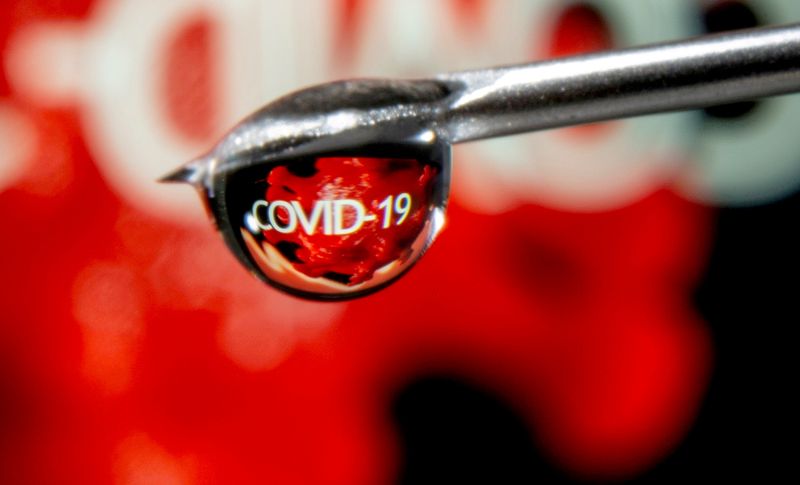By Nancy Lapid
(Reuters) - The following is a summary of some recent studies on COVID-19 and cancer presented at the annual meeting of the American Society of Clinical Oncology (ASCO) in Chicago.
Blood cancer patients show strong T-cell response to COVID vaccines
Patients with blood cancers have a significantly weaker antibody response to COVID-19 vaccines than patients with solid tumors, but they may still be well protected against severe illness from the virus, new data suggests.
Researchers at Monash University in Australia studied immune responses after three doses of the COVID vaccines from Moderna (NASDAQ:MRNA), Pfizer/BioNTech or AstraZeneca (NASDAQ:AZN) in nearly 400 adults with active or recently treated cancers. Only 3.2% of the 256 patients with solid tumors lacked antibodies capable of neutralizing SARS-CoV-2 and preventing infection, compared to 30% of the 137 with hematological malignancies, researchers reported on Saturday at ASCO 2022. But responses of immune cells called T cells, some of which can kill cells infected with the virus, were similar regardless of cancer type. T cell responses, therefore, may indicate immune protection "for those without antibody response," the researchers said.
The same team reported in a separate presentation on Saturday that data on the safety of COVID-19 vaccines for cancer patients "are reassuring." Survey responses from nearly 500 adults and children showed most experienced some after-effects, with pain at the injection site and fatigue most common. But severe reaction rates were low (ranging from 0%-10%) and interruptions to cancer treatment were uncommon (0%-11%). "No significant change in quality of life was reported for dose 1 or 2 in children or adults," the researchers said.
Breakthrough COVID-19 in cancer patients is often serious
A large proportion of vaccinated cancer patients who develop breakthrough COVID-19 require hospitalization, according to data collected by the American Society of Clinical Oncology and reported at ASCO 2022.
Researchers studied 231 patients who had breakthrough infections while receiving treatment for cancer or within a year of treatment. The patients had received at least one dose of a vaccine from Pfizer/BioNTech, Moderna or Johnson & Johnson (NYSE:JNJ). Most of the breakthrough cases occurred more than six months later. Among patients with non-metastatic solid tumors and breakthrough infections, nearly 20% were hospitalized. Hospitalization rates for blood cancer patients with breakthrough COVID-19 ranged from 32% to 56%.
"While the fraction of patients in the ASCO registry with breakthrough cases who were hospitalized remained fairly constant throughout 2021 (about 40%), those with breakthrough cases occurring in the last month of 2021 and early 2022 had a lower hospitalization rate (at about 20%), which is consistent with less severe cases of COVID-19 in patients infected with the Omicron variant," the researchers said in a summary of their presentation. "A majority of SARS-CoV-2 infections occurring six months or more after vaccination suggests waning vaccine efficacy over time that could be impacted by additional doses," they said.
Cancer patients over-represented in long COVID group
Cancer patients account for an outsized proportion of people who end up with persistent, troublesome symptoms after recovering from COVID-19, a condition known as long COVID, U.S. researchers reported on Saturday at ASCO 2022.
From a nationally representative sample of over 4.3 million people diagnosed with COVID-19 between January 2020 and February 2022, they identified 1,700 adults with long COVID and found that 37.3% were cancer patients. The most common cancers were skin (seen in 21.9% of the cancer patients), breast (17.7%), prostate (8.3%), lymphoma (8%) and leukemia (5.7%).

Among long COVID patients, those with cancer were older than non-cancer patients, more likely to have other medical conditions, and more likely to have been hospitalized for COVID-19. The researchers call for "further investigation to identify risk factors for long COVID in patients with cancer."
Click for a Reuters graphic https://tmsnrt.rs/3c7R3Bl on vaccines in development.